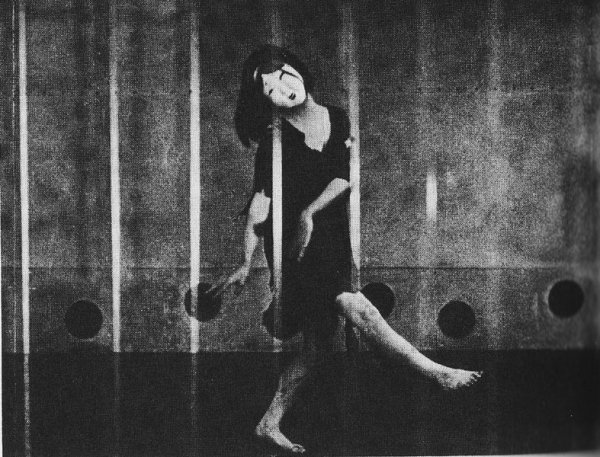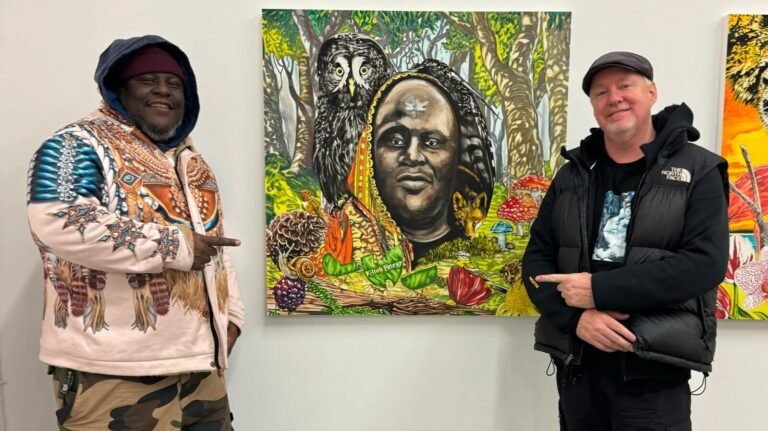
The very first Japanese Horror film and one of the only Japanese silents to survive WWII, is unlike anything you’ve ever seen. With a dynamic live soundtrack by The Anvil Orchestra: Roger Clark Miller (Mission of Burma) and Terry Donahue (Alloy Orchestra)!
A PAGE OF MADNESS (Dir. Teinosuke Kinugasa, 1926, 73 mins).
Set in an insane asylum, it’s often difficult to tell if the viewer is seeing through the inmates’ or the caretakers’ eyes, or if a division between the two even exists. A surrealist visionary fever-dream is matched only by our adventurous improvisational musician’s willingness to follow the film where-ever it leads. The art direction was co-designed with members of the Japanese avant-garde movement called Shinkankakuha (which means “school of new perceptions”). The director’s interest in exploring the subject of subjective reality and mental illness stemmed from a visit to a mental hospital and a chance encounter with the reigning emperor Yoshihito, who, rumored to be mentally ill, was generally kept away from the public eye. After it’s initial celebrated release the film was lost for over 45 years, and later found by the director himself, randomly unearthed in the basement of his warehouse in 1971.
CRITICAL ACCLAIM:
“Ultimately, it may be the best—that is, the most fascinating and the most terrifying—madhouse movie ever made and makes all other efforts at visualizing the subjective experience of mental and emotional disarray look childish and campy by comparison. The feeling of A Page of Madness is of being exposed to a secret cinema, a covert subconsciousness-caught-in-amber history of movies, happening beneath the culture we thought we knew, perhaps while we sleep. There are, thank God, still mysteries to unearth in the forgotten closets of the world, and still unknown movie experiences that seem to have come out of nowhere.”-
Michael Atkinson -San Francisco Silent Film Festival
“Playing on a continual discordance between subjective and objective reality, using superimpositions, rapid and insistent visual patterns and overlapping fantasy sequences, A Page of Madness builds an atmosphere of astonishing intensity. Since the vast majority of Japanese films from the silent era are lost, the existence of a film as unusual and important is a real stroke of luck. With its bold and striking visual style and its close connections to the most progressive thinking about film of its day, it’s no wonder that A Page of Madness has become one of the most discussed and debated of Japanese films.”-Chris Fujiwara, Ebertfest
About the Anvil Orchestra:
Talented musicians, composers, and arrangers, Miller and Donahue have performed individually and collectively in celebrated music and art festivals as well as preeminent cultural institutions around the globe. These include SNF Nostos Festival in Athens, Greece; IDFA in Amsterdam, the Netherlands: Lincoln Center (NYC); Pordenone Silent Film Festival (Italy); The Academy of Motion Pictures (Los Angeles); The Louvre (France); The San Francisco Silent Film Festival (S.F.); MASS MoCA (Massachusetts); National Gallery of the Arts (Washington DC); The Institute of Contemporary Arts (Boston, MA); New England Conservatory of Music (Boston, MA); The Telluride Film Festival (Colorado); and All Tomorrow’s Parties (international), among others. This will be their return to Epsilon Spires, after performing a live score to the German Expressionist masterpiece: The Cabinet of Dr Calagari at our venue in 2022.
Terry Donahue grew up in Connecticut and has long been fascinated by “found sound”. This curiosity has led him to be an integral part of Boston’s percussion scene as a founding member of the Concussion Ensemble, Alloy Orchestra, Zero Zero, and Arcade Ambo. He plucks his 4-string in country music in a country setting in his country home in Bennington, VT.
Roger Clark Miller studied composition at California Institute of the Arts and piano at the University of Michigan. In 1979, he moved to Boston and co-formed Mission of Burma. Since 1980 he has released over 50 albums, ranging from the aggressive avant-punk of Burma to piano-based music of Maximum Electric Piano, The Binary System and Birdsongs of the Mesozoic. His chamber music has been performed at the New England Conservatory, Tufts University, and other venues.
Miller is also a conceptual/sound artist. His first art installation in this direction, “Transmuting the Prosaic”, was at the Brattleboro Museum and Art Center in Brattleboro, VT from March 15 – October 12, 2020. He is also a visual artist utilizing Max Ernst’s Frottage technique, and has been in numerous shows. In addition to The Anvil Orchestra, Miller is currently active in Dream Interpretations for Solo Electric Guitar, The Fourth World Quartet, M2, The Trinary System, and his chamber music.
https://www.facebook.com/events/619358703398501/











